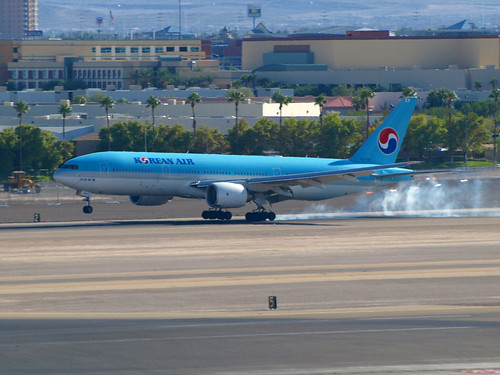
I’m enjoying Malcolm Gladwell’s latest book, Outliers. In the same vein as Freakonomics, it looks deeper into why certain people or events deviate from the norm, become exceptional – why they are “outliers”. It’s helped create a new view on something that has puzzled and frustrated the world of Digital Radio, and handily includes references to Aviation and Korea, which is where we start.
One of the chapters in the book is called “The Ethnic Theory of Plane Crashes“, and describes the infamous crash of Korean Airlines flight KE801 into Guam in August 1997. (There’s an episode of Air Crash Investigation that covered it – Part I, II, III, IV, V). To summarise, the pilot flew his 747 plane into the ground, despite the instrumentation and the crew being well aware of what was going to happen in good time to be able to avoid the accident. 228 of the 254 passengers died.
It happened at a time when Korean Airlines was putting planes into the ground with worrying frequency. In the book, Gladwell says Korean Airlines was crashing planes 17 times more frequently than United Airlines. This wasn’t due to badly maintained aircraft, or dangerous conditions – the crews just kept crashing their planes. (I don’t know if “17 times” is accurate, but I do know that it’s a well established rule in flying circles never to fly KE metal, and one I have myself stuck to rigidly, preferring to route LHR-FRA-ICN on my trips to Korea).
The obvious conclusion is that Korean Airlines crews were incompetent, but Gladwell suggests it wasn’t incompetence – it was deference. The Korean culture is so deferential to figures of authority or power, the members of the crew who could see danger increasing simply did not feel that they could bring it to the captain’s attention. It was socially unacceptable for them to question his judgment, or even infer that he wasn’t fully aware and in control of his aircraft. Looking at the transcripts from the flight recorder, it’s excrutiating listening to the First Officer hint and suggest to the Captain that they might actually be flying straight into the ground. Only when there’s less than 7 seconds to impact does the First Officer clearly call for a “Go Around”. Too late.
This degree of deference can be measured – the PDI (Power Distance Index) measures the degree to which people are deferential to figures of authority or power. The PDIs of many nations (cultures) have been measured, and there is a remarkable correlation between the amount of deference in a in culture, and the plane crashes in those countries. It seems to be that such a degree of deference negates the value of having subordinates to help provide vital input and monitor situations.
So where’s the connection with Digital Radio?
It turns out that there’s another nation with a high PDI. France. France has a PDI value of 68 – it’s a highly deferential nation. (In context, Britain and Germany have values of 35, and Austria just 11).
All of a sudden, things are clicking for me. Here’s why.
France chose a non-standard version of DAB – a cut-down version of mobile TV (basically, mobile TV minus the video, or with very little video). Something that the Koreans (them again) invented and dubbed T-DMB. The most prominent figure in that decision for France to the use Korean originated T-DMB system was a man called Sylvain Anichini.
M. Anichini was the Director of Technology for Radio France – in hierarchical terms, he was pretty much at the top of the roost in French Radio. For whatever reasons he had, he became a passionate and vehement supporter of T-DMB. And he would give not a moment to anyone who didn’t agree with his decision. It’s maybe understandable that he repelled approaches from the other DAB nations, on the basis that his “sovereignty” might be undermined. I believe he stormed out of more than one WorldDMB meeting, and was very insulting in public session to a number of fellow professionals. It might also be the case that M. Anichini found dealing with Koreans, and their deferential culture, much more appealing than dealing with those apparently insolent and disrespectful English and Germans.
What’s interesting is the number of people within the French radio industry who privately disagreed with both M. Anichini’s decision, and his behaviour. I’m aware, both directly and indirectly, of heavy sighs when discussing the path being followed, but I (and others) could never understand why those people who were uncomfortable with the direction taken would never raise the issue more openly. I was obviously failing to understand the immense gulf between our culture and the French culture, and what appears to be a overriding and almost smothering cultural barrier to challenge bad decisions made by a person above you. (Maybe this is also why the French are so apparently tolerant of the dalliances of its politicians?).
What was happening in France with DAB had parallels with what happened to flight KE801. One man, whether intentionally or just out of disorientation, was about to bring everything crashing into the ground, and his subordinates and colleagues could not do anything to stop it.
Of course, with Digital Radio, nobody got hurt (apart from a bit of pride) and nobody died. Compromises were made, and positions adopted that allowed the French decision to accommodated, albeit at a financial cost for the entire DAB community worldwide. M. Anichini left Radio France at some point after the decision was taken, but before licences were awarded by the CSA.
So what did Korean Airlines do to turn around their appalling safety record? They hired an American and enforced the use of English in the cockpit, as a way of breaking down the deferential barriers created by the Korean language. It seems unlikely that the same approach would be appropriate for Digital Radio in France.


